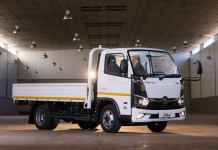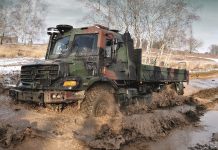Markus Geyer recently took the helm of MAN’s South African operations. Ryan de Smidt asks him about his plans for the company’s future
Markus Geyer is well acquainted with MAN Truck & Bus South Africa. He has been a non-executive director of the company since 2004 and, until recently, he had headed up MAN’s Middle East and Africa operations, a position he held for five years. In that capacity he oversaw the brand’s operations in countries across the continent.

He’s delighted to have been appointed managing director of the South African entity. “My responsibilities entail sales, aftersales and administration within all of MAN’s Southern African regions… all the right hand drive countries as well as Angola, since we are close by and best able to offer support,” he says.
Geyer maintains that though he is familiar with MAN’s local operations, a major challenge within the initial three months of taking up his appointment has been to understand the organisation in greater detail. And one of his first priorities has been to set the wheels in motion to rectify a fall-off in the brand’s market share.
While he admits that the state of the country’s economy is partly to blame for the decline – month on month, truck sales generally have fallen by as much as 13% in some segments – he lists a number of other contributing factors to the situation in which MAN’s sales find themselves– changes in top management; too much internal focus; and a period in which alignment with new guidelines from Germany took place.
“While we focused on those, I think we lost a little concentration on the market and on our customers. We have just launched a project which clearly states that we need to be more market driven and customer orientated.

“The aim is to train, teach and inspire our people to live up to those values, and arrange our business processes to support our teams at points of sale, whether they be in workshops or in showrooms. Our internal aspects have been rectified and now we can solely dedicate our focus to our customers. That is the way it should be.”
In addition to MAN’s truck and bus products, the brand recently launched in Europe a light commercial vehicle which competes in segments dominated by sister brand Volkswagen’s Crafter and Mercedes-Benz’s Sprinter models.
“We believe that this model will help to extend the influence of the MAN range in a positive manner, since many of our customers make use of our products from the extra-heavy segment all the way through to our smaller commercials.

“The new model broadens our scope and offers our customers greater opportunity. At this stage the vehicle will not be introduced immediately to South Africa – but there is a very good chance that it will join our range in the future. I believe it will be a perfect fit for the country since it’s been engineered to withstand the kind of conditions that we experience here,” Geyer said.
In terms of other new models on the horizon, Geyer confirms that MAN’s Southern African operation will continue to handle sales and service for Volkswagen’s range of Constellation commercials.
Though perceived as a premium product, the Constellation locally has failed to live up to expectations in terms of predicted sales forecasts. Geyer notes that in Brazil – the country of production – the vehicle is a market leader and is used for applications in environments that are similar to those found in Africa.

“In recent years the Brazilian currency has been relatively strong in relation to the rand, and we have struggled to bring in Constellation products at a price which is competitive against those of rivals.
“However, recently the Brazilian real has lost a lot of value and we believe that we are now able to enter the South African market at far more balanced level. With sales of vehicles in Brazil at low ebb, our colleagues there are more focused on their exports, and in this sense South Africa stands to gain.
“For instance, we will be able to introduce more vehicles that utilise Euro5 technology. With this in mind we are aiming to increase our market share for the Constellation quite significantly.”
At the moment the Constellation is imported as a CKD kit and assembled locally, with South African-made components fitted where possible. Geyer says there are no plans at this stage to change the arrangement. “Taking into account the vehicle’s current market share, it wouldn’t make sense,” he says.
Asked about the effect that changes to South Africa’s road transport legislation will have on MAN’s products – an 80km/h speed restriction for commercial vehicles comes into effect in December – Geyer says the company has the matter well in hand.
“As a standard feature, all of MAN’s trucks and busses are built with speed restrictors which are electronically calibrated to conform to desired limitations of a specific country or an operation,” he says.
In my view, Geyer’s obvious passion for the MAN brand – and his drive to promote the nameplate’s attributes in South Africa – augurs well for the fortunes of the local company. He appears to genuinely have his customers’ interests at heart and, in the short time he has been managing director of MAN Truck & Bus SA, has actively sought to remedy perceived weaknesses in market strategy. In all, that can only be good for the brand and, in general, for trucking in South Africa.















